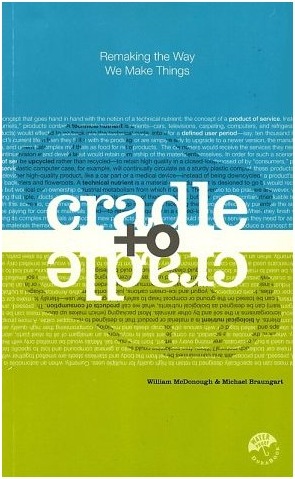Submitted on
 Many readers, I would think, are familiar with the 2002 thought-changing book, "Cradle to Cradle," by Virginia architect William McDonough and German chemist Michael Braungart, a founder of Germany's Green Party and an activist of wide influence. I have read most of it once — I had to return it to the library or risk punitive measures — and I'm just picking it up again, from the beginning, now that I've decided that this, clearly is a book to keep, not borrow.
Many readers, I would think, are familiar with the 2002 thought-changing book, "Cradle to Cradle," by Virginia architect William McDonough and German chemist Michael Braungart, a founder of Germany's Green Party and an activist of wide influence. I have read most of it once — I had to return it to the library or risk punitive measures — and I'm just picking it up again, from the beginning, now that I've decided that this, clearly is a book to keep, not borrow.
Briefly put, and with apologies to the authors for my imperfect synopsis, their message is that we need a radically different approach to design and production of everything, so that instead of doing the best we can — recycling, for example — with the waste stream that is the inevitable byproduct of how we roll, we rethink everything, especially the inevitability of a waste stream.
The title alludes to a different way, in which we try to adjust our behavior much earlier in the process, so that we know, before we design or produce anything, how we're going to reuse a resource after its first intended use has been achieved. Perhaps I haven't opened my mind wide enough yet, but I think this paradigm won't lead to no waste, but it will lead to vastly less of it.
When I was reading it the first time, I had the thought then that it would be worthwhile to share brief portions with you along the way, and this is the first in that series...
Consider this: All the ands on the planet, taken together, have a biomass greater than that of humans. Ants have been incredibly industrious for millions of years. Yet their productiveness nourishes plants, animals, and soil. Human industry has been in full swing for little over a century, yet it has brought about a decline in almost every ecosystem on the planet. Nature doesn't have a design problem. People do.
The biomass comparison is fascinating in itself, but the larger allusion is even greater. We can probably achieve what the ants do. We don't have to foul everything on the planet to thrive on the planet. We just need a new approach.
Copyright by the authors; published by North Point Press.
- Anonymous's blog
- Log in to post comments